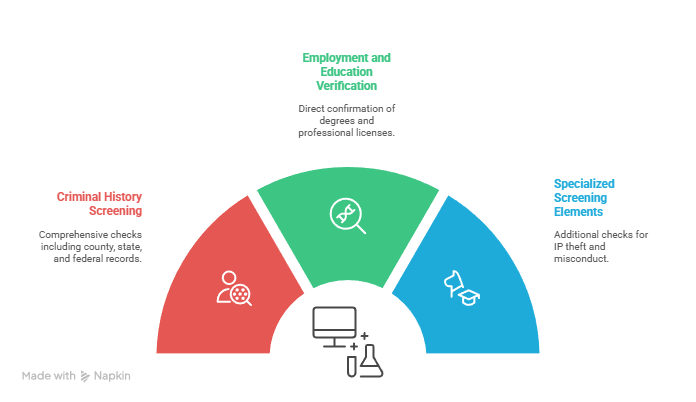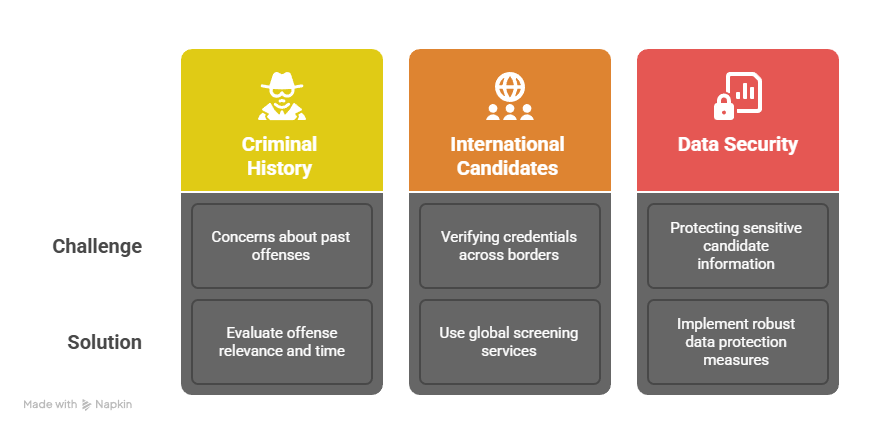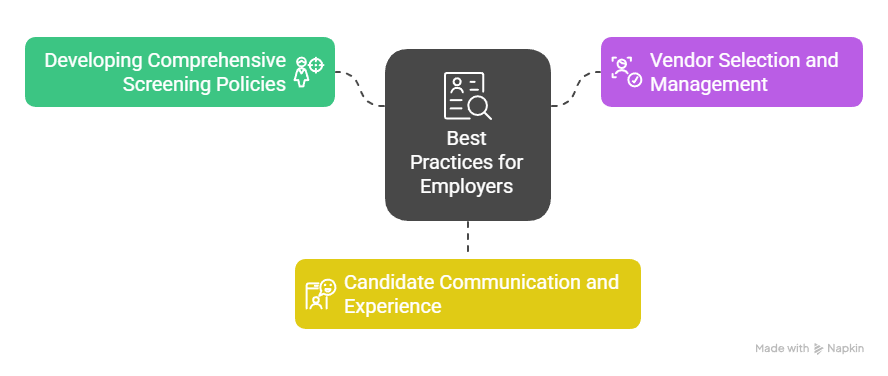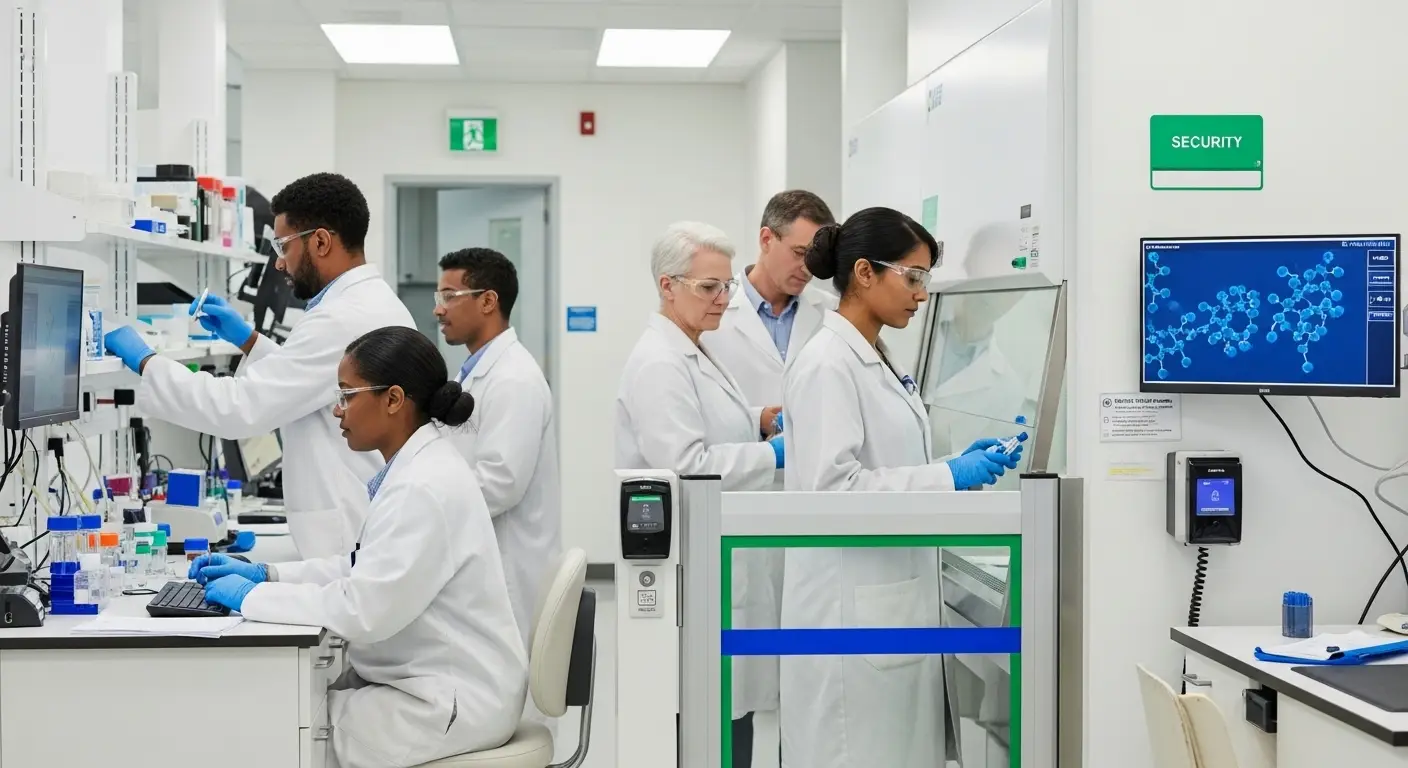The biotechnology industry in North Carolina is booming, and this guide is here to help anyone looking to understand background check processes, especially those tied to DHHS CLIA and select-agent rules. Whether you're a potential job seeker wanting to navigate these checks or an employer aiming to comply with regulations, we'll cover it all. Discover what makes these background checks unique and ensure you're well-prepared for employment in this thriving sector.
Key Takeaways
- Background checks in North Carolina's biotech sector are critical for ensuring compliance and security within this sensitive industry.
- The state's specific regulations dictate thorough checks into educational and professional backgrounds, especially for roles dealing with delicate biological materials.
- Federal guidelines further require detailed screenings to confirm candidates' eligibility to handle controlled substances safely and without legal risk.
- Employers must balance the depth of these checks against timing and cost, aiming to maintain a secure and compliant workforce.
- Adapting to advancements like AI in the screening process can enhance efficiency while staying informed about evolving regulations ensures continued compliance.
Introduction
North Carolina has emerged as a top player in the biotech field. Its strength lies in its blend of innovation, research facilities, and skilled workforce. As the industry grows, so do the demands for rigorous background checks. These checks are not just regulatory hurdlesâÂÂthey ensure that only qualified and trustworthy individuals enter this sensitive field.

The purpose of this guide is simple: to help you navigate the complexities of background checks within the biotech sector in North Carolina. Whether you're aiming for compliance as an employer or seeking clarity as a job seeker, understanding these processes is indispensable. Proper background checks contribute to both safety and security in the workplace, protecting valuable research and maintaining public trust. By grasping the details outlined in this guide, you'll better prepare for the unique challenges presented by this booming industry.
As a human resource professional working for high-stakes fields, I can see that a misstep in the background check process can create consequences that reach beyond the hiring process; it can compromise trust, compliance, and innovation. In North CarolinaâÂÂs vibrant life sciences environment, these screenings are not only procedurally required; they are critical for protecting sensitive research, complying with federal and state guidelines, and ensuring that talented professionals possess effective tools. IâÂÂve seen dialogue with outstanding candidates that know nothing of the detailed complexities involved for these screenings, just as IâÂÂve seen employers that naively believe that technology can be the sole exclusive compliance solution. It is critical that we approach background screening not simply from a compliance requirement, but a shared responsibility that protects all stakeholders involved â from patients and research study participants to the teams working tirelessly toward breakthroughs.
What Makes Biotech Background Checks Unique in North Carolina?
North Carolina stands out in the biotech industry due to its specific background check requirements. These checks are tailored to meet both federal standards and state-specific demands, ensuring safety and compliance within the industry's sensitive areas.
Biotech background checks in North Carolina often require a deeper dive into educational and professional histories. The state's regulations necessitate validating academic credentials and professional licenses due to the technical nature of biotech roles. For example, if you're applying for a position that involves handling biological materials, your educational background in biology or a related field will be scrutinized to confirm authenticity and relevance.
Another unique aspect involves the handling of sensitive information, such as proprietary research data. Background checks often include a component that ensures potential hires have no history of intellectual property theft or breaches. This protects companies from risks associated with corporate espionageâÂÂa big concern in biotech.
The regulatory environment amplifies the need for detailed criminal history screenings. North Carolina background checks require that biotech firms conduct thorough county-level and statewide searches. This means if you've lived in multiple counties within the state, each will be examined for any criminal records that may impact your suitability for employment.
Does your employment history demonstrate trustworthiness and competence in previous biotech roles? In North Carolina, thereâÂÂs an emphasis on assessing your past positions and responsibilities. Employers are keen on confirming previous job titles, duties, and lengths of employment to mitigate risks.
Biotech facilities often work with controlled substances or infectious agents. This brings us to compliance with DHHS CLIA and select-agent rules, making checks more stringent. Candidates must demonstrate a history free from drug-related offenses, aligning with federal Select-Agent Program requirements that oversee access to particular pathogens and toxins.
What does this mean for you as a potential job candidate in North Carolina's biotech industry? You're not only expected to bring specific technical skills to the table but also to pass rigorous checks that ascertain your integrity and capability to safeguard sensitive information and materials. As an employer, these checks help you ensure compliance and preserve your companyâÂÂs innovations and research.
Federal Regulatory Compliance Requirements
Background checks in North Carolina's biotech industry hinge on strict federal guidelines. At the forefront are the policies outlined by the FDA and the Department of Health and Human Services (HHS). The FDA establishes rules ensuring that individuals working with drugs, medical devices, or biological products are vetted appropriately. This encompasses a thorough review of any criminal records and employment history that could impact the person's ability to comply with safety standards.
As an employer, you're also navigating HHS protocols, especially if your employees handle controlled substances or select agents. The HHS requires detailed screening to verify that employees are cleared to access sensitive materials. For example, anyone working in a lab approved for select-agent work must pass extensive background checks, confirming they pose no security risk.
You might wonder why this level of scrutiny is necessary. Consider the impact a single lapse can haveâÂÂboth legally and on public trust. If an unqualified individual accesses controlled substances without a proper background check, the resulting consequences can be severe. Proper compliance helps prevent these scenarios.
Reflect on whether your current practices align with these federal requirements. Are you integrating the necessary steps to ensure safety and compliance? This process is not just about regulatory adherence but also about safeguarding your organization and its stakeholders.
State-Specific Biotech Regulations
North Carolina's Department of Health and Human Services (DHHS) has a vital role in overseeing the licensing of laboratory personnel. Ensuring compliance with state regulations begins with an understanding of DHHS guidelines, particularly for labs handling sensitive materials. The state mandates stringent oversight to maintain safety and integrity in biotech operations. For instance, employees working in labs with select agents must meet specific clearance standards dictated by both federal and state authorities, making their background checks more comprehensive.
Candidate consent and rights are pivotal, governed by the Fair Credit Reporting Act (FCRA). In North Carolina, like the rest of the U.S., employers must obtain written permission from candidates before conducting background checks. This step is crucial, not just a formality. As a candidate, you're entitled to know what information will be collected and how it will be used. If adverse action is taken based on the background check, you have the right to dispute inaccuracies. This protects both the applicant and the employer, ensuring that hiring decisions are fair and based on accurate data.
To navigate these requirements effectively, consider how your policies align with state laws. Evaluate whether your current practices fully comply with DHHS licensing protocols and FCRA guidelines. How transparent are you in communicating these processes to candidates? Addressing these questions could not only enhance compliance but also improve trust and engagement with applicants in this rapidly expanding sector.
Essential Components of North Carolina Biotech Background Checks

Criminal History Screening
Background checks in North CarolinaâÂÂs biotech sector require a detailed analysis of criminal history. This includes both county-level searches and broader statewide screenings through the State Bureau of Investigation (SBI). Why focus on county-level searches? Because they provide the most current and detailed local information. Crimes are tried where they occur, so checking the counties tied to a candidateâÂÂs history is key to filling any gaps.
Additionally, don't overlook federal records. These are essential for ensuring the candidate hasnâÂÂt been involved in larger-scale criminal activities beyond state lines. Combining county, state, and federal checks offers a comprehensive view. ItâÂÂs not just about finding red flags but understanding the context and implications of those findings for your specific role.
Employment and Education Verification
In the biotech industry, where credentials are critical, verifying academic accomplishments and professional licenses isn't optional; it's fundamental. Degrees should be confirmed directly with issuing institutions. For licensed positions, verify with the appropriate licensing board. This helps prevent the costly mistake of hiring under-qualified individuals.
Employment history checks deserve your attention too. They confirm that candidates possess the claimed experience and have maintained the professional standards expected in their roles. Gathering this information can also uncover discrepancies, such as fabricated job roles or tenures, which reflect on the candidate's integrity.
Specialized Screening Elements
The biotech field, especially in North Carolina, is ripe with innovation and sensitive projects. Background checks can safeguard intellectual property by thoroughly vetting potential employees. Any history of intellectual property theft or similar misconduct should be closely scrutinized to protect your companyâÂÂs assets.
Regulatory compliance is another layer to consider, especially for candidates with previous industry experience. Conduct thorough checks on whether they've adhered to sector-specific regulations, as this underscores their reliability and potential fit within your organization. Each step in this process is more than just a requirement; itâÂÂs a strategic move to maintain the integrity and innovation of your business.
Legal Framework and Compliance Requirements
Every background check in North Carolina's biotech sector must align with legal standards to ensure fairness and accuracy. The Fair Credit Reporting Act (FCRA) is central to this process. Under the FCRA, before taking adverse employment actions based on a background check, you must provide a pre-adverse action notice to the candidate. This notice should include a copy of the background report and a summary of their rights. If you decide against hiring, send an adverse action notice outlining your decision and the candidate's right to dispute the findings.
Let's talk about candidate disputes. If inaccuracies are found in the background report, candidates have the right to challenge and correct errors. Prompt, efficient handling of disputes not only complies with the law but also enhances your company's reputation.
Equal Employment Opportunity Commission (EEOC) guidelines also play a role. They emphasize the need for individualized assessment when evaluating criminal history. Consider the nature of the offense, the time elapsed since conviction, and its relevance to the job. This helps ensure decisions are job-related and consistent with business necessity, minimizing discrimination risks.
How does this all come together in practice? Imagine a candidate with a past minor offense unrelated to their biotech role. An individualized assessment might show the offense has minimal impact on their ability to perform the job safely and effectively. This approach can help you make fair hiring decisions that comply with legal standards.
When preparing for background checks, stay informed about these legal requirements. They not only protect candidates but also shield your organization from potential legal pitfalls. Are there gaps in your current process that could be addressed? Keeping compliant can save time and resources down the line.
Fair Credit Reporting Act (FCRA) Compliance
When conducting background checks, FCRA compliance is non-negotiable. Your organization must follow strict protocols, especially in terms of adverse action procedures. If a background check reveals information that might prevent hiring, you're required to provide a pre-adverse action notice. This includes a copy of the report and a summary of rights under FCRA. This allows the candidate to review the information and respond.
Moreover, if your final decision remains unchanged, you must follow up with an adverse action notice. It should clearly state your decision, furnish contact details for the agency that supplied the report, and outline rights for disputing inaccuracies.
Speaking of disputes, candidates have a right to contest incorrect or misleading information. Make sure your process includes a clear path for them to do so. This can help protect your organization from potential legal issues while ensuring fair treatment for all candidates. Are your procedures up to standard, and do they support candidate rights effectively? Consider refining them to include clear communication and accessible dispute processes.
Equal Employment Opportunity Commission (EEOC) Guidelines
The EEOC mandates that employers conduct an individualized assessment when evaluating a candidate's criminal history. This means you must consider several factors before making a decision. These factors include the nature and gravity of the offense, the time that has passed since the offense, and how the personâÂÂs circumstances have changed since then. The focus is on understanding whether the criminal conduct is relevant to the duties and responsibilities of the job.
Linking criminal history to business necessity is crucial. You should assess if excluding someone based on their criminal record is justified by the specific job's requirements. For instance, if a biotech position involves handling sensitive data or access to controlled substances, a history of theft might be relevant. However, it's important you avoid blanket bans. Each case should be evaluated on its specific facts, considering the potential risks involved and the context of the past offense.
This personalized approach not only follows EEOC guidance but also reduces legal risks. It ensures fairness in hiring while maintaining safety and integrity in the workplace. How do you ensure your hiring practices align with these guidelines?
Timeline and Process Overview
Standard Processing Timeframes
Background checks aren't a one-size-fits-all scenario. Each step in the process has its own timeline, and understanding these can help manage expectations. Typically, the entire background check process can take anywhere from a few days to several weeks, depending largely on the thoroughness and scope.
- Initial Screening Phase: This is usually the first step. Basic checks, such as identity verification and criminal record searches, often take 1-3 days. This step can vary significantly depending on the speed of response from local courts or police departments.
- Employment Verification: Confirming a candidate's work history can take anywhere from 2 to 5 days. It depends on how quickly past employers respond to verification requests. Employers sometimes drag their feet, which can cause delays, but a professional background check service will know how to keep things moving.
- Academic Verification: Verifying academic credentials might take about 3-5 days. Some institutions respond quickly, while others may have lengthy bureaucratic processes. It's crucial to ensure this is thorough, especially in biotech roles where education plays a vital role.
- Professional License Verification: In the biotech industry, verifying licenses is critical. This process can take around 1-2 weeks, as it often involves checking with the licensing bodies, which have their own processing times.
Understanding these timeframes allows you to better plan for recruitment needs. If you're scheduling onboarding around background checks, these phases will give you a clearer picture. Would planning your hiring timelines with these phases in mind help you streamline your recruitment process?
Expedited Processing Options
For those in a hurry, rush services are available. These options can drastically reduce waiting times, sometimes completing essential checks within 24 to 48 hours. While faster, these services may come with extra costs. Consider the trade-off between time and expense, especially if the new hire fills a critical position. Quick processing can mean the difference between landing your ideal candidate and losing them to another opportunity.
Cost Considerations and Budget Planning
Typical Pricing Structure
Background checks come with various pricing options. Employers can choose from packages like basic, comprehensive, and executive-level, all of which offer different depths of investigation tailored to job roles. A basic package usually includes a simple criminal check and may cost between $50 to $100. In contrast, a comprehensive check, which could cover criminal history, education verification, and prior employment checks, could range from $100 to $300. Executive-level checks, often required for high-level positions, delve deeper into financial records and professional reputations, typically costing upwards of $500.
Cost-Benefit Analysis for Employers
Thorough background checks are an investment in risk mitigation. While the upfront costs of a detailed screening process may seem substantial, they outweigh the potential fallout from hiring errors. A single bad hire in biotech could lead to regulatory fines or loss of proprietary information, which are far costlier in the long run. By filtering candidates meticulously, employers protect themselves from legal troubles and preserve their intellectual assets. Making informed hiring decisions contributes to a stable, compliant, and productive workforce, ultimately saving on unforeseen liabilities and enhancing company sustainability.
Industry-Specific Considerations
Biotech roles often demand tailored approaches to background checks. You need to account for the unique responsibilities and risks associated with different positions within the industry. HereâÂÂs a breakdown of what it entails:
| Position Type | Details |
|---|---|
| Research and Development Positions | R&D roles are at the forefront of innovation. Employees have access to sensitive and proprietary information. YouâÂÂll want to focus on detailed screening processes here. Ensure candidates' academic credentials and any existing patents are verified meticulously. Screening should also assess previous compliance with research ethics and intellectual property guidelines. Past disputes or violations in these areas can indicate potential risks. |
| Manufacturing and Production Roles | In manufacturing, adherence to regulatory standards is critical. Positions often require compliance with DEA and GMP regulations. Background checks for these roles should include drug-related screenings and checks for prior regulatory violations. YouâÂÂll want candidates who uphold production quality and safety standards, as lapses here can lead to severe consequences. |
| Clinical Research and Healthcare Roles | Patient safety is paramount in clinical roles. Candidates in these positions should undergo screenings that emphasize compliance with Good Clinical Practice (GCP) standards. Check for any history of malpractice or patient-related incidents. Verifying credentials and previous employment in healthcare institutions ensures candidates meet the high ethical and professional standards necessary for these roles. |
Understanding the specific demands of each sector within biotech streamlines the hiring process and mitigates risk. Tailoring your approach to background checks for these industry-specific requirements not only ensures compliance but also safeguards your organization against potential mishaps.
Common Challenges and Solutions

Addressing Criminal History Concerns
Hiring someone with a criminal history in compliance-heavy fields like biotech can be tricky. You want to follow the law, but also make fair, unbiased decisions. The EEOC advises considering factors like the nature of the offense, how much time has passed, and if the offense relates to the job. For example, an old non-violent offense might not impact a candidate's ability to do lab work. Use these considerations to align your hiring policy with business necessity, reducing legal risks while giving qualified candidates a fair chance.
Managing International Candidates
Screening international candidates presents unique hurdles. Verifying overseas education and criminal histories can be challenging due to differences in records and reporting practices. Consider using global screening services that specialize in international checks to help bridge this gap. Also, be mindful of varying privacy laws and consent requirements across countries to ensure compliance. Providing clear instructions and staying transparent with candidates about your processes can also help ease concerns and foster trust.
Technology and Data Security Concerns
Protecting personal data is crucial in the background check process. Ensure your systems use robust encryption and security measures to safeguard candidates' information. It's wise to regularly review and update your data protection policies to keep pace with evolving cybersecurity threats. Also, inform candidates how their data will be used, stored, and protected. This transparency not only builds trust but also positions your organization as responsible and ethical, which can be a deciding factor for top talent.
Best Practices for Employers

Developing Comprehensive Screening Policies
Creating robust screening policies tailored to specific job positions is crucial for biotech employers. Start by identifying the unique demands of each role. For instance, research positions might require deeper scrutiny of educational backgrounds and any past involvement with proprietary information. Meanwhile, manufacturing roles might demand checks aligned with manufacturing standards like DEA compliance.
Develop a matrix that outlines the necessary components for each role. This matrix should specify checks like criminal history, academic credentials, and regulatory compliance. By aligning the screening policy with job specifics, you'll ensure a more relevant and effective evaluation process.
Regularly review and update these policies to stay aligned with industry standards and legal requirements. Consider feedback from past recruitment cycles to refine your approach. This adaptation ensures your policies remain relevant and comprehensive.
Are your current policies aligned with your organization's needs? If not, start with job descriptions and work your way through to identify gaps. A well-structured policy reflects positively on your organization, ensuring both compliance and a fair chance for all applicants.
Vendor Selection and Management
Selecting the right background check service provider is crucial for effective employment screening. As you navigate this decision, consider both the breadth of services offered and the provider's understanding of industry-specific regulations. A good starting point is to evaluate the provider's experience in the biotech sector, particularly with North Carolina's unique landscape.
You'll want to focus on quality and accuracy. Compare providers based on the technology they use to gather and analyze data. A reliable provider should offer comprehensive reports without compromising on speed. Look for a service that integrates seamlessly with your existing HR systems, reducing manual processes and errors.
Cost is always a factor, but don't let it be the sole determinant. Assess the value provided in terms of compliance assurance and report accuracy. Providers who offer transparent pricing without hidden fees are generally preferable. Ensure they have a clear policy on handling disputes or errors in reports, and see if they offer guidance during audits or regulatory challenges.
A provider's customer support can make a significant difference. Opt for companies with dedicated support teams who understand your specific needs. They should be available to address questions promptly and provide training on using their services effectively.
Finally, ask for references. Hearing from other biotech firms in North Carolina can provide insights into the providerâÂÂs reliability and customer satisfaction. Engaging with a well-selected vendor can streamline your hiring process, boost compliance, and, ultimately, enhance your organization's overall performance.
Candidate Communication and Experience
Clear communication transforms the background check experience for candidates. It's not just about ticking boxes but about making the process transparent and respectful. Start by explaining what to expect. Tell candidates why each step matters. This builds trust and eases concerns.
- Keep candidates informed at every stage. If there's a delay, let them know. Silence breeds anxiety and undermines confidence in your company. A simple update email can mitigate that.
- Feedback matters too. If a report returns surprising results, discuss it openly. Offer a fair chance for candidates to explain or correct possible inaccuracies in their records. It shows integrity and respect for their personal history.
- Encourage questions. It ensures candidates don't feel left in the dark. Transparency lays a solid groundwork for a positive employer-candidate relationship.
Implementing these practices can streamline your hiring process, ensure compliance, and create a smoother experience for all parties involved. Are you ready to optimize your screening strategies?
Conclusion
As North Carolina's biotech sector continues its rapid expansion, implementing comprehensive and compliant background check processes is essential for maintaining industry integrity and protecting valuable research assets. By understanding the unique regulatory requirements, leveraging best practices for vendor selection and candidate communication, and staying current with federal and state compliance standards, employers can build a robust screening framework that supports both safety and innovation. Success in this dynamic industry ultimately depends on balancing thorough due diligence with fair hiring practices, ensuring that only qualified and trustworthy professionals join the ranks of North Carolina's thriving biotech workforce.
Frequently Asked Questions
What does a NC background check consist of?
An NC background check typically includes criminal history, employment verification, education verification, credit history, and address history. Public records like court documents might also be included.
How long does it take to get a background check in North Carolina?
The time youâÂÂll wait can vary. It usually takes a few days to a week. Some checks might take longer, depending on the complexity.
Does NC follow the 7-year rule?
Yes, North Carolina generally follows the 7-year rule for reporting certain types of information like civil judgments, tax liens, and arrests. However, this can vary based on the position and salary.
Does NC State do background checks?
Yes, North Carolina State University conducts background checks on its employees and prospective hires. This includes criminal history and employment verification.
How long does an UNC background check take?
At the University of North Carolina, background checks typically take around one week, but this can vary depending on circumstances.
What sort of things show up on a background check?
A background check can reveal criminal records, credit history, employment history, education verification, and sometimes driving records.
Are traffic violations included in a background check?
Minor traffic violations usually donâÂÂt appear on background checks, but serious offenses like DUIs generally do.
Can I get a copy of my background check?
Yes, you have the right to request a copy of your background check from the company that performed it. This allows you to verify and understand the reported information.
Will my credit score affect my job application in NC?
Employers in NC might consider credit history for certain positions. However, they wonâÂÂt see your credit score, just your credit history details.
Can an employer in NC run a background check without my permission?
No, employers must obtain your written consent before conducting a background check. ItâÂÂs part of compliance with the Fair Credit Reporting Act (FCRA).
Additional Resources
- Life Sciences Industry in North Carolina | EDPNC
https://edpnc.com/industries/life-sciences/ - Biopharma Economic Development: North Carolina | BioPharm International
https://www.biopharminternational.com/view/biopharma-economic-development-north-carolina - Accelerating Equitable Growth in North Carolina's Life Sciences Cluster | Brookings
https://www.brookings.edu/articles/accelerating-equitable-growth-in-north-carolinas-life-sciences-cluster/ - North Carolina State of Technology 2025 Industry Report | NC TECH (PDF)
https://www.nctech.org/_files/_pdf/talent/NC%20Tech%20State%20of%20the%20Technology%20Industry%20Report%202025.pdf

GCheck Editorial Team
Meet the GCheck Editorial Team, your trusted source for insightful and up-to-date information in the world of employment background checks. Committed to delivering the latest trends, best practices, and industry insights, our team is dedicated to keeping you informed.
With a passion for ensuring accuracy, compliance, and efficiency in background screening, we are your go-to experts in the field. Stay tuned for our comprehensive articles, guides, and analysis, designed to empower businesses and individuals with the knowledge they need to make informed decisions.
At GCheck, we're here to guide you through the complexities of background checks, every step of the way.






